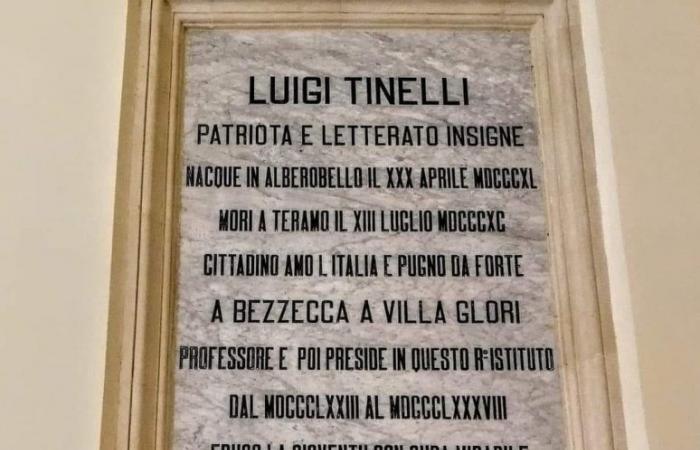In the heart of ancient Lecce, the memory of the meritorious work of Luigi Tinelli (1839 – 1890) is entrusted to a plaque from 1891, placed shortly after his premature death. The testimony, in the photo, appears at the entrance to the great hall of the Liceo Palmieri, at the time in what is now Piazzetta Carducci.
Tinelli, a teacher beloved by his students and by the city of Lecce, who wanted to honor his memory, was able to imagine the future by founding “Il Gazzettino Letterario di Lecce”.
When, on 10 July 1878, the first issue of that periodical was published which welcomed the contributions of the best minds of Terra d’Otranto and beyond, Tinelli was just 38 years old and had already held the teaching of language and language in that high school for five years. Italian literature.
Originally from Alberobello, he was a fervent supporter of Garibaldi who, before dedicating himself to teaching, had distinguished himself among the patriots who had fought at Villa Glori in 1867 to free Rome from the papal government and unite it with Italy. After having obtained the qualification to teach Italian in high schools at the University of Naples, he was sent to Lecce in 1873 to teach in the Palmieri High School, where then, due to his merits as an excellent educator, he also held the position of Principal. In that high school, illustrious teachers such as Clemente Antonaci, a native of Martano, professor of Latin and Greek literature, taught alongside Tinelli; Carlo Del Piano, professor of history; Roberto Pasquinelli, from Lucca, professor of philosophy; Giuseppe Ceschi, from Modena, mathematics teacher already at the age of 23; Giuseppe Eugenio Balsamo, born in Lecce, member of various Academies, including that of the Georgofili of Florence as well as Secretary of the Economic Society of Terra d’Otranto; Enrico Perillo, native of Nardò, professor of Anatomy and Physiology.
Luigi Tinelli, also author of some precious works[1]was a tireless promoter of culture[2]. The Gazzettino literary of Lecce, his creation, appeared in 1878 in a literary context in strong ferment[3]. The city, which at the time had just over twenty thousand inhabitants, already boasted a respectable library and provincial archaeological museum, the first in Puglia, born from the tenacious dedication and enlightened vision of Duke Sigismondo Castromediano. The purpose of Tinelli, founder of that legendary periodical, was immediately clear and humbly put in writing to avoid any misunderstandings. In the first editorial he made it clear that he intended to disseminate culture, as rich and widespread as possible, at a very low cost so that he could reach anyone. Many people collaborated on those pages with enthusiasm and competence, making the best contributions of foreign literature known also in the Land of Otranto. Francesco Rubichi reviewed Victor Hugo, Émile Zola and Jules Verne; Francesco Muscogiuri dedicated two essays to Gérard de Nerval and Charles Baudelaire, while Aleardo Trifone Nutricati Briganti translated Baudelaire and Leconte de Lisle. The magazine, despite its short life (it ceased in 1880), was capable of decisively marking the cultural value of the city at the end of the nineteenth century. In those pages appeared the contributions of many young and brilliant authors destined to become famous, such as Vincenzo Ampolo, Ersilio Bicci, Cosimo De Giorgi, Pietro Palumbo, Leonardo Spampacchia, Stanislao Sidoti, Gaetano Tanzarella, Arcangelo Valente, Angelo Lo Re, Francesco Rubichi, Luigi Tinelli, Antonio Profilo, Francesco Moscogiuri, Aleardo Trifone Nutricati Briganti and others. In that periodical politics was strictly banned, “presumptuous arrogance” and the “light vanity of appearing and swinging every now and then“. In the debut editorial it was written: “We will not curse the old because he is old; nor will we clap our hands at the new because it is fashionable. We will look at old and new with a serene mind and with a youthful soul“.
Luigi Tinelli, a learned man of letters and a true gentleman, much loved by his students who appreciated his moral integrity, modesty and abilities, died prematurely on 3 July 1890. On 5 February 1891 the Corriere Meridionale published the news of his commemoration, which took place in a vast corridor of the Palmieri High School. In the presence of the civil authorities, the press, a large representation of the judiciary, the teaching staff and a huge crowd of students, the memory of Tinelli was entrusted to the touching words of the Principal of that high school, Prof. Luigi Tamburrini, and professors Clemente Antonaci and Guglielmo Gigli. Finally, as the news of the time reported, the memory expressed by Francesco Rubichi moved every soul, provoking a hurricane of applause.
Giorgio Mantovano
[1] L. Tinelli, School memory, Lecce, Campanella typography, 1876; Id., Alessandro Manzoni: speech, Tipografia Editrice Salentina, 1874; Id., Giacomo Leopardi’s broom: critical essayBarletta, 1871.
[2] G. Gigli: “In the solemn Parentali of Luigi Tinelli”. Speech held in the R. Liceo Palmieri, Lecce. Typ. L. Lazzaretti, Lecce, 1891.
[3] On the subject, without any claim to exhaustiveness, see D. Valli, Literary culture in Salento: 1860-1950, Milella, 1971; Id., One hundred years of literary life in Salento (1860-1960), Lecce, 1985; F. Martina, The charm of Medusa. For a history of Salento intellectuals between culture and politics (1848 – 1964), Fasano, 1987; M. Marti, Cultural lifein AA.VV., History of Lecce. From Unification to the post-war periodedited by MM Rizzo, Editori Laterza, 1992, pp.575-625.
,
Sponsored Link






